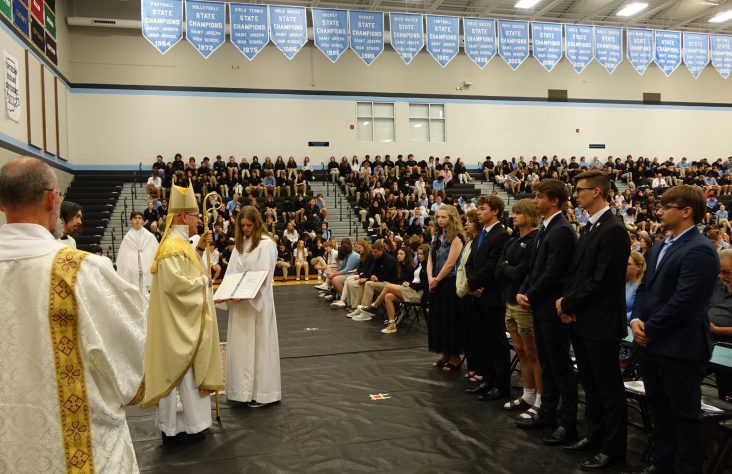September 16, 2015 // Local
What’s a Catholic to do? Marriage in conflict
By Tim Johnson
MISHAWAKA — With the upcoming World Meeting of Families in Philadelphia, the fortification of family and marriage will be celebrated. But how should the faithful respond to a changing culture that defines family in multiple ways. Fred Everett, co-director of the Office of Family Life, offers some insight to these issues.
TC: Pope Francis recently made some comments at his Aug. 5 audience, “Catholics who have divorced and are civilly remarried ‘are not, in fact, excommunicated — they are not excommunicated — and they absolutely must not be treated as if they were.’” What does this mean for Catholics in the Diocese of Fort Wayne-South Bend who are in this situation?
Everett: On the one hand, what Pope Francis said does not represent a change in current practice at all. Since the 1983 Code of Canon Law, those who have divorced and remarried civilly are not considered excommunicated. St. John Paul II made it clear decades ago that they must not consider themselves as separated from the Church, because as baptized Christians, they can and must share in her life.
This means that Catholics who are divorced and remarried civilly in our diocese are encouraged to attend Mass faithfully, to meditate on the Word of God, to develop a deeper prayer life, to contribute to works of charity and to efforts to promote justice, and to raise their children in the Christian faith.
However, the Church holds that their living together as husband and wife is a breach or countersign of that covenant into which one or both entered with their true spouse. Jesus was very clear in the Gospels to label such a breach as adultery, regardless of the quality of the original marriage.
On the other hand, the pope’s comments signal that a change is needed in pastoral practice. Sometimes divorced and civilly remarried individuals do not feel enthusiastically welcomed in their parishes, nor have they always been encouraged to grow in their spiritual lives so that they can once again be fully integrated in the sacramental life of the Church. So, it is possible for divorced and civilly remarried Catholics to receive communion if they repent of having broken the sign of the covenant with their first spouse, confess this sin, and resolve to live under the same roof as “brother and sister,” refraining from sexual relations.
TC: What does this mean to Catholics of the diocese who remarried, abandoned the Catholic Church and attend another faith tradition because of divorce? How should we welcome them back?
Everett: We need to signal that, as sinners, every one of us has a past and that anyone can find a future and a home in the Catholic Church. It doesn’t necessarily mean focusing primarily on specific situations or wrongful behaviors, but in reaching out in welcome and accompanying people in their spiritual lives so that they can be fully integrated into the sacramental life of the Church.
To welcome people means more than having friendly greeters at the entrance of the Church. We have to be prepared to walk with someone where they are and to do so in a nonjudgmental manner that also opens them to growing in holiness, establishing a path by which, whatever their circumstances, they can grow in a deeper friendship with Jesus Christ. Above all, it entails accompanying people in their spiritual lives so that they can be fully integrated back into the sacramental life of the Church.
TC: How should the Catholics in the pew respond to those who feel excommunicated because of divorce?
Everett: Divorced men and women are in need of the human warmth and concrete support of the parish community. Simple gestures like making sure to include someone in conversation, inviting someone to accompany you to a parish activity or out for coffee, lending a listening ear and a compassionate heart, offering occasional help with childcare, are a beautiful witness of Christian solidarity and may be a lifeline to someone who is struggling with loneliness in living a single lifestyle again.
We need to offer divorced men and women a path for growing in holiness and a community of support.
TC: For those divorced and not civilly remarried, please explain their role in the Church and the reception of the sacraments.
Everett: Too often, those who are divorced believe or have been told by other Catholics that they are not able to receive Communion simply because they are divorced. This is generally not the case — especially if someone has been wrongfully abandoned by his or her spouse. That person is especially in need of the spiritual support of the Eucharist.
For those who are divorced and not civilly remarried, they are still considered married by the Church if their marriage has not been declared invalid through the annulment process. This means that they need to see themselves as separated from their spouses, but still bound by their marriage vows. If a person sincerely believes that their marriage is not valid and if there seems to be good grounds for such a belief, then he or she can pursue the annulment process with the hope of eventually being able to marry. In the meantime, however, they should avoid dating or other types of romantic involvement. Unfortunately, sometimes individuals do it the other way around. They start to date, fall in love and then want to see if they can have their previous marriage annulled. This only sets up that person for possible heartache and feeling that they have to choose between the Church and their romantic partner.
TC: The pope said, “the Church has not been insensitive or lazy” when it comes to providing pastoral care to the divorced and civilly remarried. What kind of pastoral care is available to the divorced in our diocese?
Everett: For a past several years, our diocese has been offering a 12-session spiritual support program for those who are divorced or separated. The program is called “The Catholic’s Divorce Survival Guide” and was developed by author and speaker, Rose Sweet, who herself is divorced. It features a video series with noted Catholic experts such as Dr. Ray Guarendi, Father Mitch Pacwa, Christopher West and Father Donald Calloway as well as the testimonies of several divorced Catholic men and women.
The programs are offered in both the Fort Wayne and South Bend areas. St. Vincent de Paul Parish in Fort Wayne offers it twice a month beginning in September and concluding in March. On the South Bend side, the program is sponsored by the diocesan Office of Family Life and is offered weekly in both the spring and the fall at the St. John Paul II Center in Mishawaka. The next program begins on Sept. 30.
TC: How should or does the diocese reach out to those who are civilly remarried, but still desire to be active in the Church?
Everett: This is an area that is still developing in our diocese and, really, throughout the United States and the rest of the world. The reason is that this outreach requires a real balancing act. On the one hand, we want to affirm individuals and welcome them. Our faith teaches us that every human being is a great gift from God. The question is: Does our pastoral ministry reflect the depth of that teaching? Does the Church help everyone to feel like a gift?
On the other hand, the Church does not want to give the impression to individuals that it approves of the second union or that it is not a serious matter. Too often it can be easier to ignore the problem or the individual than to have to deal with the awkwardness of the situation.
Again, this underscores the importance of establishing a path of growth in holiness. If those who are in difficult circumstances — such as those who are divorced and civilly remarried — are welcomed to the Church, this does not require that they immediately must be challenged with the objective sinfulness of their situation. If this person can be placed on a path of growth in holiness under someone’s mentorship, this fact can be dealt with over time and not right away. The important thing is to establish a spiritual plan of life where individuals can discover the love of Jesus Christ and to allow that love to transform their life decisions.
TC: We have seen the definition of marriage redefined in our state and by the U.S. Supreme Court. Many Catholics believe that same-sex marriage is okay. What does the Church really say about same-sex marriage? Will the Church redefine her teaching?
Everett: The Church cannot redefine her teaching regarding marriage because it is based upon human nature and the teachings of the Lord. I think that some, especially a number of young people, have allowed themselves to think that this teaching that marriage is exclusively between a man and a woman is one that is outdated and that is sure to change over time. This, however, cannot be for several reasons.
First, our very understanding of marriage is built upon the complementarity of men and women. A man and a woman fit together in a way that two men or two women do not. In addition, this very union allows the possibility of new life coming into this world and being entrusted to them not just as parents — but as a father and mother team. Marriage has then these two essential qualities — the unitive and the procreative. This is why the Church has always taught that marriage fully comes into existence only when the couple has consummated the marriage. This constitutes the sealing of their covenant and it is not something that two men or two women can ever achieve.
Secondly, the Church has always taught that homosexual acts are seriously disordered, basing itself on the Bible and on the natural law. Like marriage itself, the “marriage act” is meant to be both love-giving and life-giving, and this is possible only between a man and a woman. The newly-minted legal fiction of same-sex “marriage” presumably assumes homosexual behavior. Consequently, the very meaning and purpose of human sexuality has been explicitly rejected now that homosexual relations have been given a protected constitutional status by the highest court in our land. There can no longer be any logical moral objection to premarital relations, extramarital relations, contraception and sterilization. Sex has been reduced to a recreational activity between consenting adults and is no longer seen as the sacred sign of a covenant sealed by the hand of God.
Finally, as Catholics, we believe that the Holy Spirit guides the teaching of the Church in matters of faith and morals. We could well wonder if this central teaching about marriage and human sexuality has been wrong for more than 2,000 years, why should we even look to the Church for guidance? In fact, why should we even believe the other claims that the Church makes? Our faith, indeed, is a seamless garment, and all of her teachings are made from the same cloth. To try to rip out such an important thread that is interwoven throughout the tapestry of our faith, would leave that tapestry in shreds.
TC: Marriage is under attack on many fronts. In a few sentences, please share what Catholics can do to build good marriages.
Everett: Love — that is at the heart of building a good marriage. While feelings of love are important, much more important is the choice or decision to love since the virtue of love rests in the will — not in desires or affections. To do something for the good of another that is difficult or requires sacrifice, especially if we don’t feel like doing it, is where true love manifests itself and grows.
While skills like good communication and conflict resolution are helpful and have their place, married couples need to “put out into the deep,” and follow the path of growing in love and holiness. They will find that the closer that they grow to God, the closer that they will grow to one another. To do this requires building a deep life of prayer and putting our trust in the Lord and in the teachings of the Church. It will also entail making a sustained effort to grow steadily in the virtues that matter most in married life — virtues such as humility, trust, obedience, patience, magnanimity, purity, gentleness, prudence, love and mercy.
The best news. Delivered to your inbox.
Subscribe to our mailing list today.





